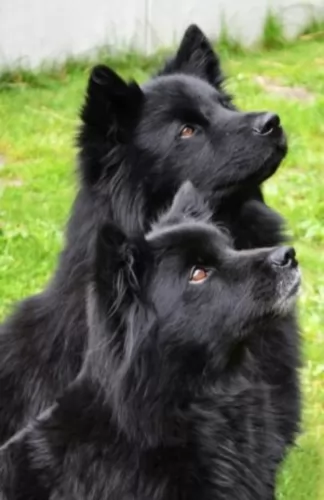 Petzlover
Petzlover English Foxhound is originated from United Kingdom but Swedish Lapphund is originated from Sweden. English Foxhound may grow 13 cm / 6 inches higher than Swedish Lapphund. English Foxhound may weigh 11 kg / 25 pounds more than Swedish Lapphund. Both English Foxhound and Swedish Lapphund has same life span. Both English Foxhound and Swedish Lapphund has almost same litter size. English Foxhound requires Low Maintenance. But Swedish Lapphund requires Moderate Maintenance
English Foxhound is originated from United Kingdom but Swedish Lapphund is originated from Sweden. English Foxhound may grow 13 cm / 6 inches higher than Swedish Lapphund. English Foxhound may weigh 11 kg / 25 pounds more than Swedish Lapphund. Both English Foxhound and Swedish Lapphund has same life span. Both English Foxhound and Swedish Lapphund has almost same litter size. English Foxhound requires Low Maintenance. But Swedish Lapphund requires Moderate Maintenance
 The English Foxhound was found in Great Britain as far back as the late 1700’s. They were bred to be scent hounds and hunt the fox by following his smell. It was a crossing of several different types of hounds that produced the English Foxhound. This included the Greyhound, the Bulldog and the Fox Terrier. It was perceived that there were not a lot of deer left in the United Kingdom to be hunted for both sport and food. So, a new dog would be needed instead for the Staghound and Deerhound.
The English Foxhound was found in Great Britain as far back as the late 1700’s. They were bred to be scent hounds and hunt the fox by following his smell. It was a crossing of several different types of hounds that produced the English Foxhound. This included the Greyhound, the Bulldog and the Fox Terrier. It was perceived that there were not a lot of deer left in the United Kingdom to be hunted for both sport and food. So, a new dog would be needed instead for the Staghound and Deerhound.
The Foxhound was developed as a pack animal bred to chase the fox followed by hunters on horses. The Foxhound was bred with incredible stamina, a great ability to follow scents, track prey, and act as a watchdog as well. This breed are pack animals. They hunt in packs and prefer to live in packs. A solitary English Foxhound is probably not a happy Foxhound. The English Foxhound is stockier and slower than his cousin the American Foxhound. The English Foxhound is recognized by the AKC and UKC. In 2012 the International Foxhound Association was developed to promote the English Foxhound.
 This is a Spitz type of dog from Sweden. It is Sweden’s national dog.The dog has always been used for herding and guarding livestock such as reindeer for the Sami people.
This is a Spitz type of dog from Sweden. It is Sweden’s national dog.The dog has always been used for herding and guarding livestock such as reindeer for the Sami people.
The dog is much the same as the Finnish Lapphund, and some even believe that it might be one and the same. The American Kennel Club recognizes them as two separate breeds.
It is one of the oldest Swedish dog breeds and also one of 3 Lapphund breeds.The Swedish Kennel Club recognized the Lapphund as a distinct breed in 1903.
The Federation Cynologique Internationale recognized this dog in 1944, and the United Kennel Club in 2006.
 The English Foxhound is a superb athlete who can run for hours without a break. He has muscular, sturdy and straight legs with round paws. His chest is deep, and his back is level. Their head is wide, and the muzzle is long with 16 inches in the front of the ears. The nose is long, and those ears are set low. They can be many colors as long as it is a “hound” color of tan, tricolor, black and white, or red.
The English Foxhound is a superb athlete who can run for hours without a break. He has muscular, sturdy and straight legs with round paws. His chest is deep, and his back is level. Their head is wide, and the muzzle is long with 16 inches in the front of the ears. The nose is long, and those ears are set low. They can be many colors as long as it is a “hound” color of tan, tricolor, black and white, or red.
 The Swedish Lapphund is a medium to large sized dog standing at between 40 to 51cm in height and weighing between 19 and 21kg.
The Swedish Lapphund is a medium to large sized dog standing at between 40 to 51cm in height and weighing between 19 and 21kg.
The head is wedge shaped and the ears erect. He has a thick double coat with fairly straight, silky hair that stands out from the body. Colors can be brown or black and sometimes there can be white markings. He sheds quite a bit, with some heavier seasonal shedding.
When you get one of these Spitz type dogs as your pet, you can be sure that you’re going to have an excellent pet and companion.
They’re independent dogs with strong wills and like to do their own thing. Training and socialization can change that and make him easy, well mannered and obedient.
They’re lively dogs and intelligent too. He is versatile, loving to be outdoors and being energetic with the children but being able to enjoy some quiet time indoors too. He is simply an excellent family pet and watchdog.
 The English Foxhound gets along with other dogs and like people. He was bred to be a pack animal, not a loner. He will get along with most any other animal and children as well. However, they are not often kept as pets because their prey drive and pursuit drive are so strong that nothing else matters. The chase is what life is all about for this breed. They are hardwired for it. They are not easy to train because they are constantly distracted by smells and movements that could send them off on the chase.
The English Foxhound gets along with other dogs and like people. He was bred to be a pack animal, not a loner. He will get along with most any other animal and children as well. However, they are not often kept as pets because their prey drive and pursuit drive are so strong that nothing else matters. The chase is what life is all about for this breed. They are hardwired for it. They are not easy to train because they are constantly distracted by smells and movements that could send them off on the chase.
Keep them on a lease when walking them so they don’t go wandering or running of. They love to run, and they love to talk – bay actually. They might slow down somewhere around 8-10 years old. They need a strong owner and a lot of exercise to be happy.
 The Swedish Lapphund has always been a hardworking dog, herding reindeer for the Sami people.
The Swedish Lapphund has always been a hardworking dog, herding reindeer for the Sami people.
Today the Lapphund is a people-loving dog and wants to be constantly with his human family. He is intelligent, strong, independent, loyal, bold and loving. If you’re looking for an excellent family companion, this is it.
Do him a favor and don’t leave him outside without human companionship as he will become run-down and possibly destructive through no fault of his own. Bring him into your family and make him part of it and then he’s happy.
 The Swedish Lapphud is a healthy dog breed, but even so he can get one of the many common dog illnesses there are.If you choose a puppy, make sure to get your pet from a reputable breeder to avoid more serious dog illnesses.
The Swedish Lapphud is a healthy dog breed, but even so he can get one of the many common dog illnesses there are.If you choose a puppy, make sure to get your pet from a reputable breeder to avoid more serious dog illnesses.
Diabetes Mellitus is a disease you might have to watch out for with this dog breed.
This is a disease of the pancreas. This organ has two groups of cells – one produces enzymes for proper digestion and the other produces the hormone insulin which regulates the level of glucose in the bloodstream.
Diabetes is when the pancreas fails to regulate blood sugar. Your dog will have increased thirst and urination, weight loss, and increased appetite.
Type I diabetes mellitus results from destruction of the insulin-producing beta cells, which is the most common type of diabetes in dogs. Dogs with this type of diabetes require insulin injections to stabilize blood sugar. Type II diabetes is more likely in older, obese dogs.
Dogs with diabetes mellitus will require insulin each day. If canine diabetes mellitus is properly regulated, prognosis for the dog is good.
 The English Foxhound is a high energy dog that needs a high quality dog food. He should be fed about 2.5 -3 cups a day in two meals of dry food. Because he is a deep chested dog, beware of bloat and don’t feed large meals, particularly before or after strenuous exercise.
The English Foxhound is a high energy dog that needs a high quality dog food. He should be fed about 2.5 -3 cups a day in two meals of dry food. Because he is a deep chested dog, beware of bloat and don’t feed large meals, particularly before or after strenuous exercise.
Seizures are caused by epilepsy, but they can be treated, and the dog can have a quality life.
When the stomach becomes distended or twisted. Can result in death if not treated immediately.
The English Foxhound’s long, floppy ears are prone to infection and allergies. Inspect and clean them regularly.
The English Foxhound is an easygoing canine, but he has an incredible energy level and needs a lot of exercise every day. In fact, if you are not going to hunt then don’t get a Foxhound. It is not fair to the dog. Of course, if you have acres of land and are into agility, tracking, coursing and rally then this might be the dog for you. But if the English Foxhound does not get enough daily exercise, he will not be a good house pet. This dog was bred to run for miles. You cant keep him cooped up in your house.
 ●The Swedish Lapphund is an active dog and will require a high quality dog food. If you buy commercially manufactured dog food it should be appropriate to your dog’s age and activity levels.
●The Swedish Lapphund is an active dog and will require a high quality dog food. If you buy commercially manufactured dog food it should be appropriate to your dog’s age and activity levels.
Home-made food like boiled chicken, brown rice, spinach and sweet potatoes will do your pet the world of good, and chopped up, it can be added a couple of times a week to the dog’s dry kibble.
Try and feed some raw met occasionally as well. Clean, fresh water should be available at all times.
●The Lapphund is an active dog and he is going to reguire daily exercise that will keep him mentally and physically fit. Having a dog like this requires you being active yourself, and your Lapphund is going to love going on long walks or hikes. He will never get enough games with the children – he just loves the rough and tumble.
● Have his vaccines attended to. There are training classes as well as boarding kennels that won’t accept your dog unless his vaccines are up to date.
● Have your dog spayed or neutered if you don’t want your dogs to have puppies.
● Brush his coat twice a week. Check inside his ears and inside his mouth for redness and infection.